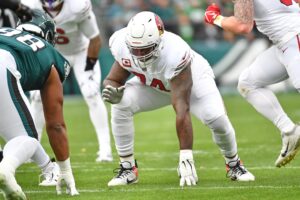The past few weeks have seen a ton of turnover at the running back position. Kareem Hunt was suspended and then cut. Melvin Gordon and Kerryon Johnson are missing games. Alex Collins went to injured reserve. Matt Breida and James Conner are now going to miss games. Teams will scramble to pick up their backups. Don’t let them. Even fantasy football teams who are set at running back should do all they can to hoard replacement players like Jeff Wilson Jr. so that their opponents are left scratching their heads at who to start.
Hoarding Running Backs Like Jeff Wilson Jr. Is a Winning Strategy in Fantasy Football
Highest Floor at the Position
It wasn’t long ago that prioritizing wide receivers over running backs was the big trend in fantasy football. People swore by the “zero running back strategy” of taking two top-tier wide receivers in the first few rounds. This became very popular in 2016, a year after almost every first and second-round running back of 2015 either missed significant time with injury or was a complete bust. The league was moving increasingly towards a passing league, with superstars like Odell Beckham Jr., Antonio Brown, and Julio Jones providing much less of an injury risk while putting up comparable points.
The league always adjusts though, and right around the same time people started searing by zero-running back strategy, teams started drafting running backs high in the first round again. Gordon, Todd Gurley, Ezekiel Elliott, Leonard Fournette, and Saquon Barkley all entered the league as first-round picks over the last three years. All which (except Melvin Gordon his rookie year) have been top fantasy options. In addition to that, even backs drafted later, like Hunt and Alvin Kamara have been top dogs in fantasy.
Outside of quarterbacks, the top eight highest scorers in standard fantasy leagues are running backs. In PPR leagues, six of the top ten scorers other than quarterbacks are running backs – including the top four. Running backs simply have the highest floor and ceiling because they see so many opportunities with the ball. While the best receiver touches the ball ten times in a good game, 10 touches would be considered a disappointment for a running back. This gives them so much potential to just go off in games.
The Most Vulnerable Position to Attrition
So, since there seems to be more options than ever at the position, it seems pointless to try to hoard all of the running backs right? Not so fast. The position is still the most vulnerable to attrition compared to others. Just this season, top backs like Jerick McKinnon and Devonta Freeman went down with injuries. Gordon and Fournette have missed time. Even deeper names like Johnson and Breida have missed games. Running backs may the most consistent when they are on the field, but they are the least consistent with staying healthy
Most fantasy leagues have two running back slots, which means a standard 10-team league will have at least 20 backs starting each week. That leaves only 12 starters left to play with. Most team owners prefer to put a running back at FLEX due to their consistency and volume. If every player were to do that, leagues would only be left with two backs left not starting. Obviously, not everyone is starting a running back, but it would be ideal to be able to.
What happens when there is an injury? A team owner undoubtedly looks to the waiver wire when their starting back goes down. Many times, there is nothing there. But sometimes, in cases like the Breida injury, a running back pops right in and takes their place. Wilson Jr. looked like he could fill right in last week for Breida. In fact, Breida was the second string behind McKinnon before he was lost for the season. Other situations like this have happened with Collins going down for the Baltimore Ravens, and Gus Edwards sliding right in to fill the role. The key here is to block the Collins or Breida owner from getting the backup, then they might be left with table scraps to start at the position.
The Best Position to Hoard
Even if a player doesn’t necessarily need a running back, just keeping as many on the bench as possible serves two big purposes. For one, it is addition by subtraction. By putting in a claim for Wilson or Edwards, or even scooping up Spencer Ware as a free agent, it takes away points that opposing teams can rack up. The other benefit is having the depth to account for the inevitable injuries that teams have to deal with during the season. By not waiting until an injury to claim a running back, it takes away the risk of waiting until waivers clear to hopefully land a productive replacement.
Many fantasy team owners like to carry multiple quarterbacks, tight ends, or even defenses. While it may be smart if they can land two of the top 10 at the position, this rarely happens. If a quarterback gets injured, there is usually a replacement on waivers who isn’t that significant of a drop-off. The opposite is true of tight ends. This year there is a huge disparity between the top five tight ends and everyone underneath, making basically anyone else a dart-throw at the position. Defenses are even more inconsistent and rarely worth rostering more than one. Top defenses like the Chicago Bears this year are exceptions to the rule, but usually, there is only a few points difference on a weekly basis between a starter and a streamer.
Wide receivers are the only other type of player worth carrying on the bench past bye weeks, but more than one or two is not that is necessary. All this considered, depth at quarterback, tight end and defense is just wasting a roster space where instead a team can just grab as many running backs as possible and hog them from all other teams.






